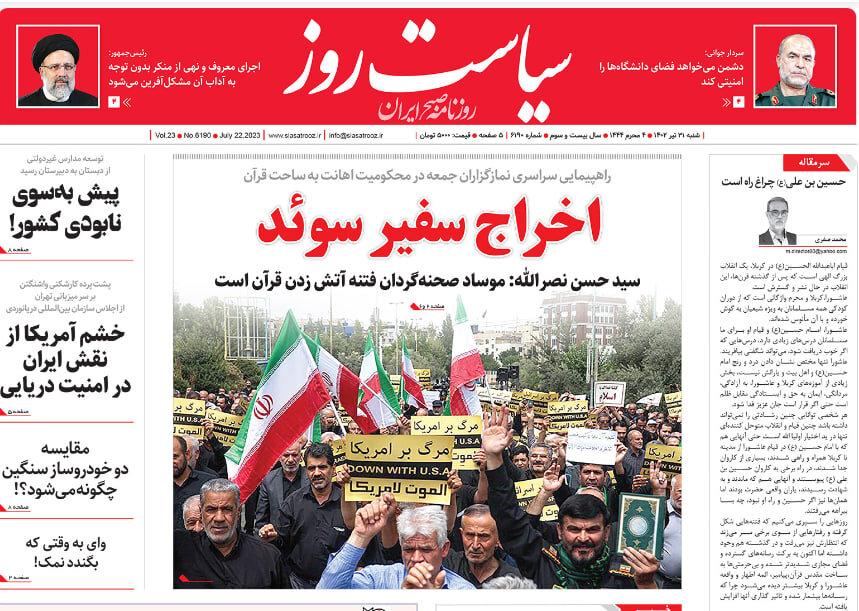American anger over Iran's role in maritime security

In an exegesis, Siasat-e-Rooz discussed Washington’s behind-the-scenes move against Tehran as Iran was set to host a maritime event in late September.
It wrote: As countries in the region and larger world are moving to utilize the capabilities of the Iranian Navy in securing the seas, which will also strengthen Iran's position in the multipolar world, the United States, in a passive action, has prevented Iran from hosting an event that was supposed to be held on World Maritime Day. Washington’s move is intended to disrupt international security through its unilateralist approach. The global voyage of the 86th naval fleet of the Islamic Republic of Iran and the security measures of the IRGC Navy in confronting the threatening behavior of Western ships in the region have provided an opportunity to strengthen security in the seas around the world. The Arab countries have emphasized maritime convergence with Tehran to use Iran's capabilities to ensure the security of maritime trade. However, since America is against global security and stands against multilateral approaches, it prevented Iran to host the maritime event on World Maritime Day in late September.
Shargh: America's failure to build coalition
Shargh wrote in a note: The U.S. attempt failed to put the name of Iran and adopt anti-Iran position in the joint statement with the Arab League. America's failure happened just a few weeks after an event that was unexpected for many observers and experts in the region, and that was the UAE's decision to withdraw from the U.S. naval alliance in the Persian Gulf. America had turned this coalition into a pressure tool to escalate maritime tensions with Iran. One day after the UAE's action, it was declared that Iran, Saudi Arabia, the UAE and Oman will form a naval coalition. Many observers evaluated this action of the UAE as a new hit to the anti-Iran efforts of Washington and the Zionist regime that were to strengthen the anti-Iran front in the Middle East. America, especially in recent months, has continuously failed to portray itself as a guarantor of security in the region. This has made its Arab allies disappointed and forced them to redefine their security partnership with the involvement of the main players in the region, including the Islamic Republic, to fill the gaps as much as they can.
Hamshahri: Provocative action of U.S. army
In a commentary, Hamshahri discussed the sending of two American warships to the Persian Gulf and said: In continuation of its policies to create tension in the region, the United States intends to send more warships to the region under the pretext of monitoring shipping in the Persian Gulf. It also plans to deploy two other warships, the USS Mesa Verde and the USS Carter Hall, along with the destroyer Thomas Hudner and F-16 and F-35 fighter jets under the pretext of providing security for oil tankers passing through the Strait of Hormuz at the mouth of the Persian Gulf region. In its statement, the Pentagon declared the dispatch of these warships to the Persian Gulf to protect ships against (what it called) Iran's actions. To justify their military presence in the Middle East and the Persian Gulf, the American authorities claim that with these measures, they ensure the security of the region for the Persian Gulf countries and the passage of ships from all over the world. However,, these moves have only increased tensions in the region, and the Islamic Republic has repeatedly emphasized that it is the responsibility of the countries of in region to secure the waters in the region, emphasizing that they are capable of doing it by themselves.
Arman-e-Melli: A cold battle in bargaining negotiations
In an analysis, Arman-e-Melli discussed the latest security actions of America against Iran. The paper said: By declaring the arrival of F-35 fighter jets and sending warships and marines to the region coupled Washington’s security doctrine, the White House is implementing its last diplomatic puzzle against Iran and wants to show the real siege of Iran in order to gain a greater share of the game against Tehran after "negotiations without war, fire and bloodshed". However, all experts believe that the best way to resolve the nuclear dispute is to revive the JCPOA, suggesting that there is no alternative to it. Therefore, it is unlikely that the current U.S. president think about a war against Tehran. Americans intend to put the last pressure on Iran. In this pressure campaign, they are not even afraid to show the prow of their ship and bombers. In this way, they intend to quit the possible nuclear negotiations with Iran powerfully.
Leave a Comment